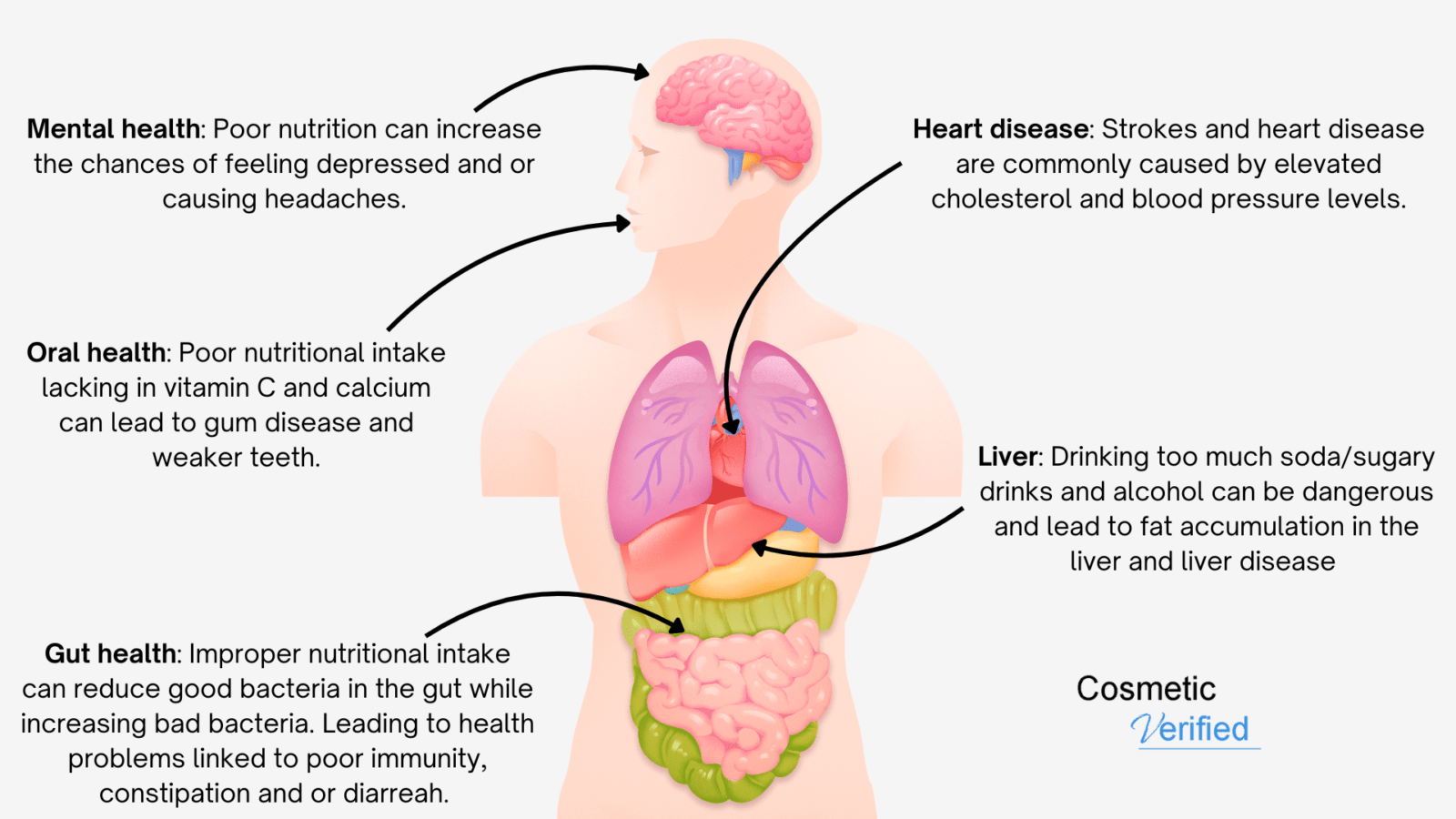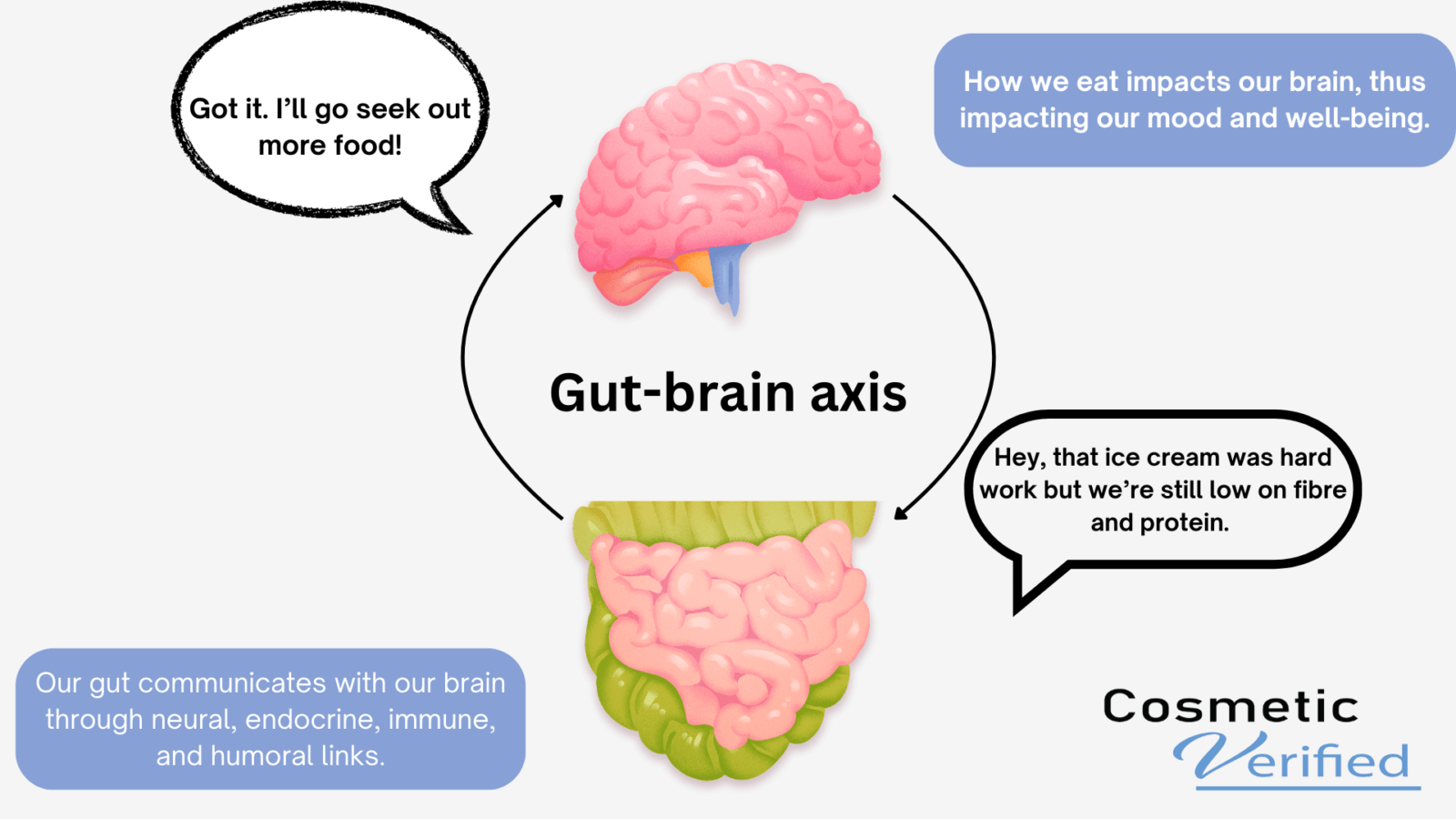How Nutrition Impacts Your
Physical & Mental Health
Nutrition is a pillar of a healthy lifestyle, influencing everything from our immune system to our mental health. Understanding the importance of nutrition can empower us all to make better dietary choices that enhance our overall well-being. In this blog post, we’ll delve into the importance of nutrition and explore how making informed dietary choices can enhance our vitality, support mental health, and promote a longer, healthier life.
Physical health impact
Nutrition affects almost every part of our body. Our bones, organs, immune system and muscles all rely on what we eat and drink to perform optimally. The better our nutritional intake, the better our health (generally speaking). There is even a strong case to be made that a good nutritious diet (over a long period of time) can make us look more attractive. This is because our skin, hair, nails and teeth all need a variety of nutrients to look healthy. A good example to highlight this is by taking a look at how eating too much junk food – too frequently affects our skin. The human skin is our body’s biggest organ and how we nourish it has often pretty visible effects. Acne which is normally caused by hormonal imbalances has often been linked to diets too high in refined carbs/sugars. Wrinkles and lines can also arise from eating too much junk food, as it can age our skin more prematurely.
Bone density and muscle mass
Calcium, vitamin D and K are crucial for healthy strong bones, while protein and potassium is essential for muscle growth and repair. A diet rich in these nutrients, along with regular exercise, can help prevent conditions like osteoporosis and maintain muscle mass as we age. Getting adequate levels of these nutrients requires a combination of eating foods like bananas, oily fish and leafy greens as well as some sun exposure (or vitamin D supplements). Adopting these lifestyle and diet changes can be difficult if you happen to live above the North Hemisphere and don’t like seafoods. That’s why we recommend taking supplements to make up for this, however, they should not be used to substitute a balanced diet.
How does nutrition affect body weight?
Firstly, let’s briefly look at the effects of poor nutrition so that we can highlight the importance of good nutrition. In our weight loss guide we mentioned that weight loss is a balance between energy intake and energy expenditure (burning calories). With that in mind, let’s say you consumed 2,500 calories on any given day and most of that came from processed foods. Let’s say a mix of cakes, flavoured yoghurt and fried chips. You wouldn’t benefit from virtually any vitamins, minerals, fibres or proteins. All of these are essential nutrients that our bodies need to function well. However, if you consumed 2,500 calories by eating fish, eggs, a variety of fruits, vegs and nuts – your body would get all it needs. From lean proteins to essential fatty acids (Omega-3), vitamins, minerals and complex carbohydrates, your body would benefit from a great variety of nutrients.
Not feeling full after eating ultra-processed foods?
Have you ever eaten a full tub of ice cream, which probably contained as many calories as half of your daily intake and still felt hungry hours later? That’s because of the lack of nutrients in ice cream and fibres in particular. This in turn will lead you to want to eat more than normal and can harm your health as a result of overeating. Simply put, eating nutritious foods over processed foods makes us feel full for longer.
Effects of poor nutrition on human body
Nutrition and immune function
A well-nourished body is one of many lifestyle factors our bodies depend on to fight off infections and diseases. Nutrients like vitamin C, vitamin D, zinc, and iron are essential for a robust immune system. A good way to ensure that you’re getting a wide range of immune-boosting nutrients is by eating a variety of colourful fruits and veg. This is why you may have heard nutritionists or other health experts advise that we should eat 5 fruits and vegetables a day (in total). Eating your favourite particular fruit or veg won’t work, unfortunately, but making a smoothie or soup can help you get around that. Which diseases are associated with poor nutrition?
Which diseases are associated with poor nutrition?
As already mentioned, a good nutritional diet is vital to help us fight off a host of illnesses and diseases, but which ones exactly? According to the W.H.O and other health institutions, the most common diseases related to poor nutrition are:
- – Type 2 diabetes.
- – Cardiovascular disease (heart disease).
- – Stroke.
- – Some cancers.
Additionally, all these diseases have one thing in common apart from being very serious and imperative to deal with, they are classed as NCD’s. If you’re not familiar with this term – it stands for chronic noncommunicable diseases, and it accounts for approximately 74% of deaths globally. This makes them the leading cause of death worldwide. NCD’s are essentially silent killers that are best treated early rather than later, but as the name suggests, they can quietly creep up on us. Having said this, it’s important to point out that diet and good nutritional intake are not the only factors contributing to NCD’s. Genetic and physiological factors have a big part to play too, and increasingly, behavioural and environmental factors, such as smoking tobacco and being exposed to harmful toxins, are also to blame.
Mental health impact
We’ve all heard the saying “you are what you eat,” but did you know that this adage extends to your brain health and cognitive abilities?
The impact of nutrition extends beyond physical health – it plays an important role with our mental health too. Our brains require a quality supply of nutrients to function optimally. Omega-3 fatty acids, for instance, are crucial for brain health and have been linked to improve memory and provide protection against neuro-degeneration. Antioxidants found in berries and leafy greens may help protect against age-related cognitive decline too. These nutrients, along with other carbs and proteins act as building blocks and a foundation to our mental health. Without them, our brains start to slow down, decisions become harder to make and problems seem to be more insurmountable than before.
Nutrients that are particularly important for mental health:
- Omega-3 Fatty Acids: Found in fish, walnuts and flax-seeds, these are crucial for brain health + mood regulation.
- B Vitamins: Especially B12 and folate, which support the production of neurotransmitters.
- Antioxidants: Found in various colourful fruits and vegetables, they help protect the brain from oxidative stress.
- Vitamin D: Often called the “sunshine vitamin,” it plays an important role in mood regulation.
The gut-brain axis: how the gut acts as a second brain
Our brain and gut are intimately connected through what scientists call the “gut-brain axis.” This bidirectional communication system means that the health of our digestive system can significantly impact our cognitive function and vice versa. As such, a healthy and diverse gut microbiome has been linked to better mental health, improved mood, and even enhanced cognitive performance. It’s not a cure for things like depression and anxiety, however, it does play an important part in regulating our mood and hormones.
This connection is so strong that the gut is sometimes called our “second brain.” The billions of bacteria in our gut influence the production of neurotransmitters, chemical messengers that carry signals between neurons in the brain. Two key neurotransmitters, serotonin and dopamine, play crucial roles in regulating mood and are significantly impacted by our diet.
What to eat for better mental health?
Before going into diet and food recommendations, it’s important to highlight water intake. Proper hydration is crucial for optimal brain function. Dehydration can impair cognitive performance, affecting memory, attention, and cause headaches. This is the easiest first step you can take to improve your mental health.
As for what to eat, some studies have shown that certain dietary patterns can positively affect brain health and how we feel. Here are some suggestions around dietary and food choices for better mental health:
- Mediterranean Diet: Rich in fruits, vegetables, whole grains, and healthy fats, this diet has been associated with better cognitive function and a reduced risk of dementia.
- MIND Diet: Similar to the Mediterranean diet, this diet emphasises foods that are neuroprotective and has been linked to slower cognitive decline. Foods high in antioxidants such as berries, dark chocolate, leafy greens etc.
- Low-Sugar, Low-Processed Food Diets: As mentioned before, diets high in refined sugars and processed foods have been associated with lower cognitive function, higher risk of depression and higher risk of anxiety.
The importance of nutrition
While nutrition alone isn’t a cure-all for physical and mental health issues, it plays a significant role in our well-being. By making informed choices about what we eat, we can support our brain health, regulate our mood, and feel more energised. Remember, small changes in your diet can lead to significant improvements in how you feel.
If you’re struggling with mental health issues, consider talking to a healthcare professional about how dietary changes might complement your treatment plan. Nourishing your body with wholesome foods isn’t just good for your physical health – it’s an investment in your mental health too.


